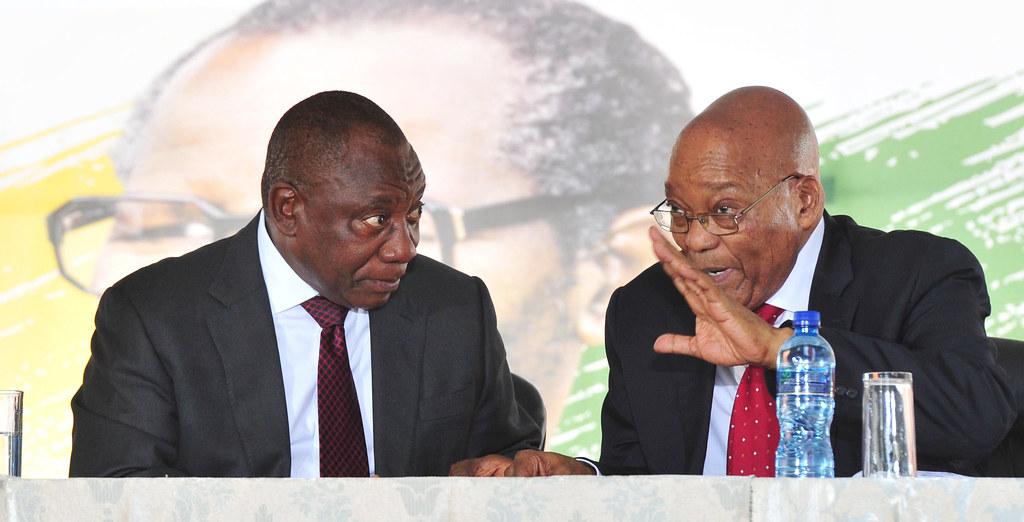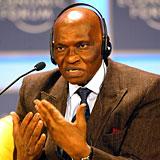What did we learn from South Africa’s exhaustive state capture commission?

A four-year investigation has revealed the scope and nature of corruption like never before.

President Cyril Ramaphosa (left) with his predecessor, former President Jacob Zuma in 2017. Credit: GCIS.
South Africa’s judicial commission into state capture, known as the Zondo Commission, recently handed over the fourth part of its voluminous and scathing findings to President Cyril Ramaphosa. As a fact-finding commission, it had to determine if there were facts that were relevant for prosecutorial purposes related to “state capture” and corruption during the reign of former president Jacob Zuma.
The commission was recommended by the former Public Protector Thuli Madonsela in November 2016 to complete her “State of Capture” report. Now at the end of its four-year long investigation, how can the commission be assessed?
For years many of the leading figures in “state capture” tried to vilify investigative journalists, NGOs and researchers who exposed their actions. The Zondo Commission, however, followed procedures of formal investigations, leading evidence, interrogating the almost 300 witnesses, and allowing for responses by the those implicated.
Cross-examination was used to test the evidence. All of this was done under the authority of then Deputy Chief Justice Raymond Zondo . Though not a court of law, it is difficult to challenge the credibility of the commission’s procedures and its outcome.
Following the work of the commission, South Africans can no longer claim not to know what happened during former Zuma’s ruinous reign (2009-2018). The financial price paid for it, the decay within state institutions, and demise of ethical public service are all products of this era. Those implicated can’t credibly claim that state capture was merely an imagination or a concocted political campaign against them. The public nature of the commission’s daily broadcasts for almost four years contributed to the public now having a much clearer understanding of corruption in the country. Whether or not the implicated persons are prosecuted and sentenced, the commission ensured that, morally, they will be held responsible.
Similar to the earlier Truth and Reconciliation Commission (TRC), however, which investigated human rights abuses during apartheid, many South Africans will be sceptical about whether the commission can make a difference. Like the TRC, this process will probably receive more accolades from outside than inside the country.
Clarifying state capture
During the Zuma years, “state capture” as a concept was often discredited by Zuma and his supporters. More recently, Zuma dismissed it as a political campaign against him. It is, therefore, important that the commission’s terms of reference included in-depth investigations to reveal the nature and scope of “state capture”.
“State capture”, the commission in the end conceptualised, was not only corruption in the public sector or the relationship between Zuma’s family and the Guptas, Zuma’s friends behind the capture of the state. It was also about infiltration of the governing African National Congress (ANC) politicians into state institutions and state-owned enterprises.
It was about how the politicians used their positions in these institutions to develop a corrupt relationship with private sector, both local and international, and share the material gains. They included Bosasa, KPMG, McKinsey, Trillian Capital, Bell Pottinger, and several South African banks. The commission also exposed how these politicians appointed supporters to key criminal justice, revenue service, and intelligence institutions.
These operatives, police and investigators would protect the politicians against investigations and also be used to discredit Zuma’s opponents in the ANC. Corruption became, therefore, a means towards the political end of state capture. Without the Zondo Commission’s prolonged public hearings, the South African public would not have understood what the capture of their state entailed.
ANC factions
Though the commission did not investigate it intentionally, the evidence it heard confirmed a symbiotic relationship between state capture and factions in the ANC. Zuma emerged as the main protagonist. When he was subpoenaed to appear before the commission, his refusal to comply became the rallying point of his “radical economic transformation” faction in the ANC. It underscored his efforts to politicise the judiciary and claim that it was under the influence of President Cyril Ramaphosa against him.
Zuma used his incarceration by the Constitutional Court for contempt of court, after his refusal to appear before the commission, to present himself as the sacrificial political prisoner. It might become evident in future that without the commission’s determination, it would have been unlikely for Zuma to be imprisoned at any time.
The legacy of this state capture history is a deeply divided ANC. The Zondo reports present vivid pictures of how it evolved, whether in the form of cabinet reshuffles, emasculating the South African Revenue Service, or using the media (such as the Sunday Times, New Age and ANN7) to discredit political opponents in the ANC.
Erosion of state capacity
The daily displays on live TV also showed how parastatals were systematically infiltrated and milked of their resources. Critically important infrastructural enterprises like Eskom, the power utility, the transport entities Transnet, Prasa and SA Airways (SAA) were eroded of their capacity.
Institutional decay in the form of loss of experienced employees, a decline in services such as passenger and freight rail-transport, unreliable electricity and water supply, erratic revenue collection and the decline of local governments, all meant not only that the state worked for other interests, but also very ineffectively.
In future it might become clear whether this process contributed towards a paradigm shift in the government’s economic philosophy. More recently, South African Airways has become partly “privatised”. Eskom is unbundling into three companies, and power generation in future will include a substantial private component. Transnet will soon allow for private passenger and freight railway services. Without the public outrage and pressure encouraged by the commission’s hearings, it might have taken longer to reach this point.
The commission part 5
Part 5 of the commission’s report is still pending. In the first four parts, a number of recommendations were made. In the first, procurement procedures in the public sector were addressed and a new dispensation proposed. The result is that government procurement services are now set to become more professional.
Regarding state owned enterprises, the appointment procedures and individual requirements of their board members and senior executives will also be addressed. Numerous recommendations about further investigations or prosecutions of implicated individuals and private business entities are also included.
But is this enough?
South Africans want guarantees to prevent a repetition of state capture or extensive corruption in future. Ideally, the commission ought to present policy and institutional designs as such guarantees. The proposed national charter against corruption is one such recommendation, but more comprehensive designs are unlikely. Early-warning systems to detect a possible recurrence, and deterrence to make the risks and cost of corruption too much, could be the starting point.
The Zondo commission has done its work. Was it worthwhile? For an answer, ask if it is possible to imagine a rehabilitated South Africa without the commission. My answer is no.![]()
This article is republished from The Conversation under a Creative Commons license. Read the original article.




